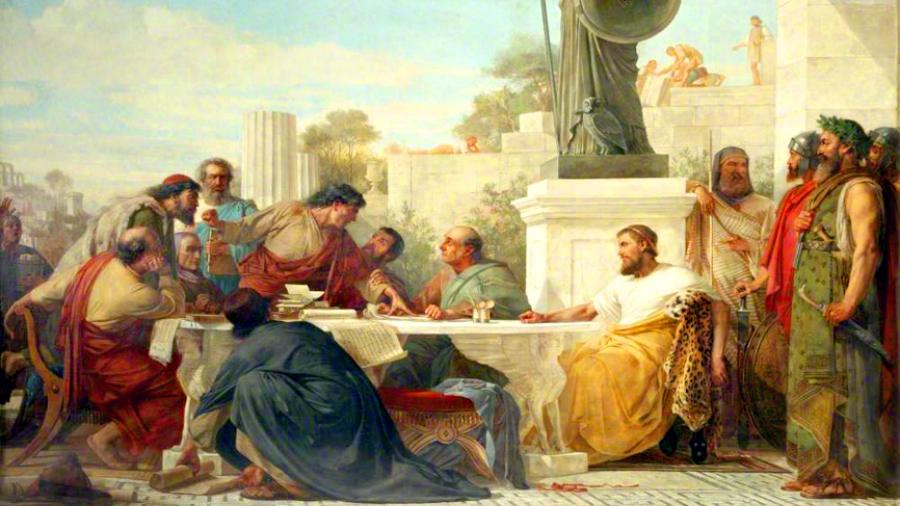Books: Elizabeth Finch
Author: Julian Barnes
Publisher: Vintage
Price: ₹799
Neil, the narrator of Julian Barnes’s latest novel, Elizabeth Finch, ruminates about the art of writing biographies — “I sometimes wonder how biographers do it: make a life, a living life, a glowing life, a coherent life out of all that circumstantial, contradictory and missing evidence.” The task of the biographer intrigues and confuses Neil because he finds himself in a position where he ends up undertaking the role of a biographer, simultaneously writing about the lives of two people separated by more than one-and-a-half millennia, yet connected through their intellect and curiosity.
Neil, one of the many students of Elizabeth Finch’s adult education course on “Culture and Civilisation”, finds himself in thrall of the sharp intellect and graceful poise of his teacher. Finch had declared that she is no Socrates and did not expect that her students would turn out to be a classful of Platos, yet that is exactly how things turn out between the teacher and her devoted disciple. On her death more than twenty years after Neil attended the course, he finds himself the inheritor of Finch’s library and her papers. Throughout the intervening years, they had kept in touch over a ritualistic lunch that took place three or four times a year and engaged in, what for Neil always turned out to be, profoundly intellectually stimulating conversations. As the inheritor of Elizabeth Finch’s scholarly legacy, Neil goes through her papers, her notebooks, and attempts to figure out what exactly Finch expected him to do with the inheritance. He ends up writing a biographical essay on Julian the Apostate, the last Pagan Roman Emperor, and this essay comprises the second part of this tripartite novel.
Julian the Apostate, the scholarly Roman Emperor, had reigned for only two years but has enjoyed a long and complicated afterlife in the Western scholarly tradition. Julian was a fascinating figure for Elizabeth, who considered his apostasy evidence of an active intelligence riddled with doubt. The defeat of Julian was a pivotal moment in the history of the world as it signaled Christianity’s conquestof paganism with the former’s emphasis on “monos” — monogamy, monotheism, monoculture — over more diverse and open forms of culture and theology. In his quasi-scholarly biographical essay on Julian, Neil scours historical and literary sources to piece together the life of a controversial figure. From early historians of the Church like Theodoret to twentieth-century novelists like Michel Butor, he looks at every possible source to form a coherent image of a life.
If the biography of Julian the Apostate lies at the literal heart of the novel, it is flanked by Neil’s attempts to make sense of the “exotic and opaque” personality of Elizabeth Finch herself. Neil’s devotion to his inspiring teacher verges on the border of adoration, so much so that his classmates tease him about his reverence for the “sainted” Elizabeth. As he has done with Julian, Neil tries to piece together the life of his beloved teacher from memory and her personal effects. In his search for what Elizabeth Finch’s personal as well as inner life might have been like, Neil questions her brother and gets back in touch with his long-lost classmates. As he has noted in his wonderings about the task of a biographer, competing, even contradictory, images of the same person emerge from his queries. Certain central questions regarding her life remain unanswered — was Elizabeth Finch really a Jew as she seemed to have implied in class once? Who was the mysterious stranger that her brother, Christopher, had once seen accompanying her? In spite of his best efforts, Neil never manages to find any satisfactory answer to his queries.
In the course of his research about the lives of Julian the Apostate and his personal quest to know Elizabeth Finch better, Neil reveals snippets of his own life. Although the narrator of the novel, he remains, at best, a peripheral subject. We get to know about his unsuccessful acting career, his career as a mushroom-grower in the countryside, his two failed marriages, his affair with his Dutch classmate, Anna, his drifting, unfocused life — the narratorial sketchiness of his life throws the two other lives that the novel focuses on into sharp relief.
In her first class, Elizabeth Finch had told her students that her course would involve “rigorous fun”. The adjective suits the novel as well as Finch’s style of lecturing. The novel demands intellectual rigour from its readers; a close and deep engagement with the unfolding narrative is required in order to enjoy it. With its sweeping timescale and eclectic scholarship, it’s not a leisurely read. But as Elizabeth Finch would have liked to remind her class, the terms, ‘rigour’ and ‘fun’, are not incompatible. This is also the case with Elizabeth Finch.










